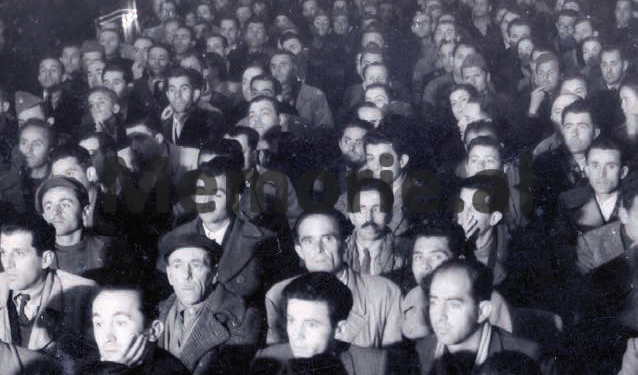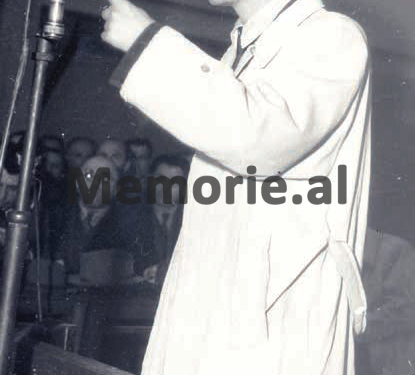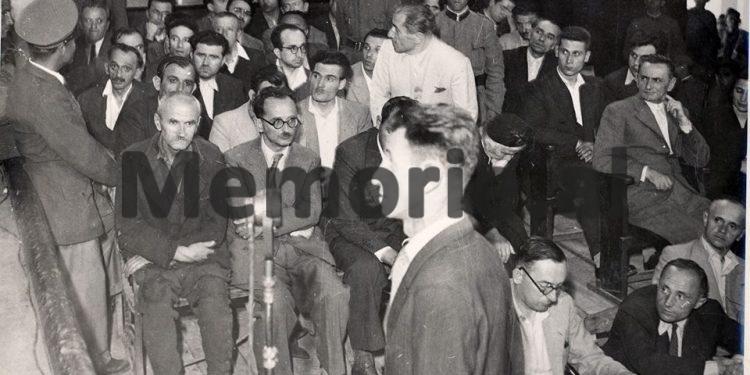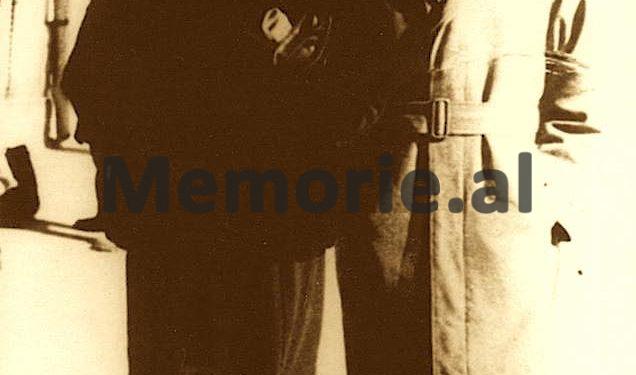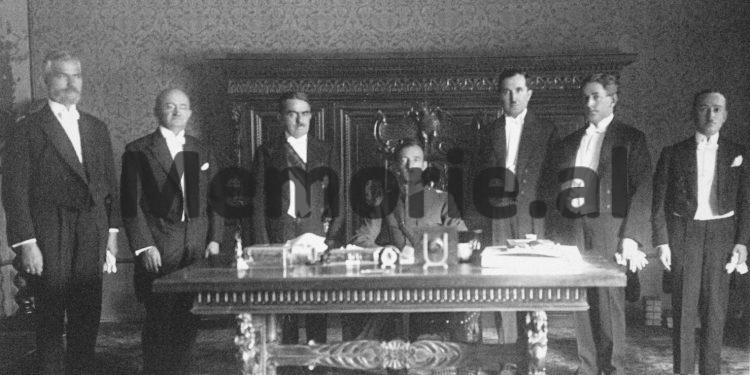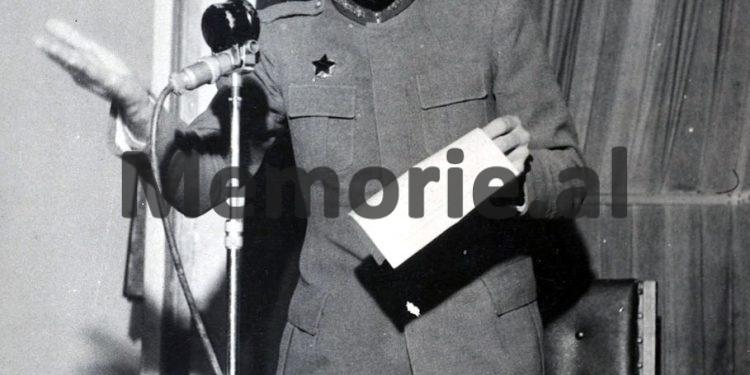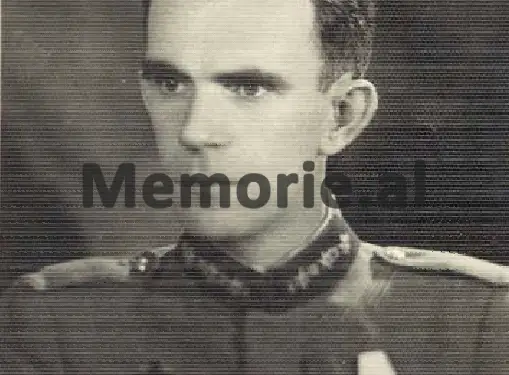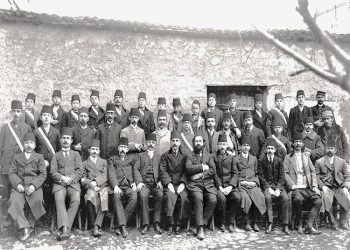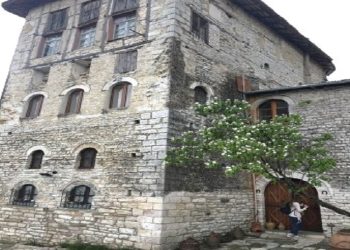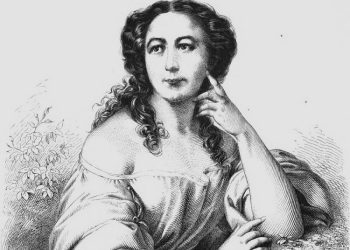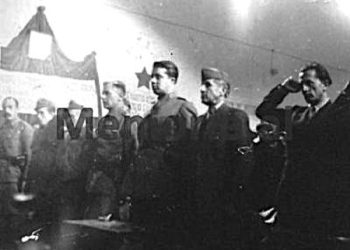Dashnor Kaloçi
Memorie.al publishes the unknown story of Abdurrahman Dibra, originally from Dibra e Madhe, who after graduating in Political Science in the capital of the Ottoman Empire, by the decree of the Sultan was appointed Deputy Prefect of Istanbul, serving in that high position until in 1921, when he responded to Zog’s call to return to give his contribution to Albania.
Abdurrahman Dibra’s long political career, starting from the deputy of Velika Dibra in the first elections of the Albanian parliament in the spring of 1921, until 1939, where for 19 years, during the period of the Zog Monarchy, he served as Minister in several government cabinets, leading the departments of Internal Affairs, Culture and Finance.
Abdurrahman Dibra withdrew from the political scene after April 7, 1939, when Italy committed fascist aggression against Albania and refused to go to Italy with the delegation that sent Skanderbeg’s Crown to King Victor Emmanuel III.
Abdurrahman Dibra’s refusal to leave Albania at the end of November 1944, after the request made by his son, Qenani, because he felt clean and the communists would not have anything to do with him. The engagement of Qenan, Abdurrahman’s eldest son, with a group of Western-leaning Tirana intellectuals formed the “Monarchist Group” and together with the “Social-Democratic Union” led by Musine Kokalari and the “Resistance Group” by Sami Qeribashi, merged. in the “Democratic Union” group, who demanded that Enver Hoxha postpone the December 2 elections and legalize the truly democratic opposition.
Although my father Abdurrahman Dibra was the deputy prefect of Istanbul and had served for 19 years as a minister and deputy during the period of the Zog Monarchy, with the coming of the communists to power at the end of 1944, there was no problem from them, the vicissitudes of our family began after the arrest of our older brother, Qenani, a law graduate in Paris and at one of Italy’s military academies. After the arrest of Qenani, we were taken out of the house on Saraçëve Street, everything we had was seized, they left us in the middle of the street. On June 17, 1946, Qenani was brought before the Military Court in Tirana together with 37 other defendants and he was sentenced to death, accused of being the leader of the “Monarchist” group, together with the “Social-Democratic” group., led by Musine Kokalari and that of the “Resistance” led by Sami Qeribashi, had united and formed the anti-communist opposition group called “Democratic Union” led by Sami Qeribashi “. This is how Urhan Dibra reminds Memorie.al, the story of his father Abdurrahman Dibra, who was imprisoned for ten years by the communists.Also in his story, Urhan Dibra tells the tragic story of his older brother Qenan Dibra, who was sentenced to death by the communists in 1946 after being accused of being the leader of an anti-communist opposition group called the “Monarchist Group.” Who was Abadurrahman Dibra from what family did he come from, where was he educated, and how did he enter Albanian political life in the 1920s? What were his relations? with Ahmet Zogu and why did he stay loyal to him for 19 years by serving as a deputy and Minister? What was the past of Abdurrahman’s son, Qanan, what was his political stance during the war? What was the Monarchist group led by Qenan Dibra, what activity did he carry out and what were the connections they had established with the Social-Democratic group of Musine Kokalari and that of the Resistance led by Sami Qeribashi? What happened to Qenan Dibra’s family after his execution on July 3, 1946, and what were the pretexts used by the Communists for the arrest of his father, Abdurrahman, in 1951?
Continued from the previous issue
What was the past of Qenan Dibra? In this regard, his brother Urhani testifies: “Qenan was our elder brother, he was born in 1912 in Istanbul. We had Qenan as a brother from his father and mother who was the first wife of Abdurrahman’s father., who had died in Istanbul.Our mother Naile Kulla, considered Qenan as her son and did not separate from us the other seven children: Adnan, Irfan, Emineja, Melihaja, Ferihaja, Sabihaja and I. During the years of the Monarchy of Zogu, Qenani graduated from the French Lyceum in the city of Korça, after graduating from the Lyceum in 1934, he gained the right to study and went to France where he graduated from the Faculty of Law of the University of Paris. He returned to Albania and worked in the Ministry of Foreign Affairs in Tirana until April 1939, when the fascist aggression against our country took place. His Military Academy the city. In 1942, he returned to Tirana and opened a law office at “Rruga Mbretnore”, where he assisted Reis Hashon from Gjirokastra. From the beginning of 1943, our brother Qenani got engaged to a girl from the city of Elbasan, whose name was Muhazez Skikuli. (Narazani). During the War period, Qanani did not interfere in politics, as he did not want to spoil Abdurrahman’s father, who often told him not to get involved in the work. In the autumn of 1944, shortly before the end of the War, Qenani wanted to leave Albania even though he was not involved in politics. “But he did not leave after his father stopped him, telling him that they both felt completely clean and that the communists had no reason to disturb them,” Urhan Dibra recalled.
Qenani, chairman of the “Monarchist Group”
Although Qenani during the period of the fascist occupation of the country had worked as a lawyer and was not involved in politics, he was formed with a western culture and was an anti-communist with deep convictions. Qenan Dibra did not agree with the policy of terror that began to follow the communist regime of Enver Hoxha, which had begun since the war, with the creation of the Albanian Communist Party. At the time, Qenan Dibra was closely associated with a group of Tirana intellectuals who had graduated from the West and had anti-communist beliefs. This anti-communist group was called the “Monarchist Group” and elected Qenan as its leader. The main goal of that anti-communist group was to create a real opposition against the Communist Government of Tirana and for that they had drafted a clear program for all the activity they would carry out. The “Monarchist Group” joined two other anti-communist groups, the “Social Democrat” led by Musine Kokalari and the “Resistance” led by Sami Qeribashi. The meeting for the unification of these three groups took place at the house of Ali Kavaja in Tirana and there the representatives of these three groups, agreed and formed the only group which was called “Democratic Union” and its chairman was elected Sami Qeribashi.Among the main points they would ask the Government of Enver Hoxha, was the respect for the rights and freedoms of the individual, to provide all citizens with freedom of speech, conscience, press, religion, free private trade and the establishment of free societies and meetings.Also one of the main requirements of The “Union-Democrat” was also the postponement of the elections of December 2, 1945, until the Government of Enver Hoxha legalized the true democratic opposition, one of the main actions that the “Union-Democrat” would take to realize those demands esave, was the meeting with the foreign Anglo-American and French representations, which were in Tirana, who would be asked to put pressure on the Government of Enver Hoxha to implement those demands and allow the legalization of the true democratic opposition. Those demands were concretized in a protest note signed by 75 members of the “Democratic Union” (out of 25 for each group) and one of the points of that note was for the Government of Enver Hoxha to protect the members of the opposition that would emerge. during the election campaign of December 2, 1945. At that time, all members of the “Democratic Union” were somewhat warmed by the fact that more or less the demands they had drafted were also requested by Gjergj Kokoshi, who was in the presidency of “Democratic Front” led by Enver Hoxha. To meet with British Colonel Palemer, who headed the British mission in Tirana, the “Democratic Union” instructed Qenan Dibra, Shaban Balla and Reis Hashon, who presented him with all the drafted requests. The Anglo-American mission, led by Colonel Hodgson and Harry Fultz, presented those demands to Enver Hoxha in a meeting with him, but Enver not only ignored them, but called them interference in internal affairs. Seeing the position of Enver Hoxha who did not consider any of the demands made to him by the Anglo-American mission, the group “Union-Democrat did not come out in open opposition, but worked illegally and on election day on December 2, 1945, distributed a tract calling for sabotage and boycott of the elections, calling them anti-democratic.
Qenan was sentenced to death
As a result of that activity carried out both before and after the elections in the days of the election campaign, the “Democratic Union” group came to the attention of the State Security, less than a month and a few days after the elections of December 2, in January 10, 1946, was preparing to hold the meeting of the Constituent Assembly that would proclaim the People’s Republic of Albania, began the arrests of all members of that organization in Tirana and other districts. A few months later, on June 17, 1946, they were brought before the Military Court, which held hearings at the “Nacional” Cinema (formerly “November 17”), presided over by Major Frederik Nosi, President of the Court and two members.: First Captain, Nexhat Hyseni and Veledin Zeneli. The prosecutor of that trial was the First Captain, Nevzat Haznedari. The group of defendants as members of the “Democratic Union” who would be tried in that trial and were as defendants there, consisted of: Gjergj Kokoshi, Sami Qeribashi, Suat Asllani, Ali Kavaja, Shaban Balla, Reis Hasho, Professor Çoka, Xhahit Koka, Enver Hasa, Hivzi Golja, Qemal Bicaku, Llazar Papapostoli, Mehmet Ali Beshiri, Semiras Vërlaci, Mahmut Mëniku, Anton Dukagjini, Musine Kokalari, Haki Gjinishi, Kole Rodhe, Lluka Bibi, Myrteza Beli, Haki Karahoxhaj, Talat Beça, Vahit Vërdova, Pali Ternova, Nefail Skikupi, Musa Dizdari, Hasan Kalaja, Taqi Ruso, Xhevat Miluka, Stefan Bumçi, Nesti Orollogaj and Pjerin Shala. During the court hearings in the great hall which was filled with people of the State Security, hysterical shouts were constantly heard: “On the rope, on the rope”. The trial against these defendants continued until July 2, the day on which the President of the Court, Frederik Nosi, gave the decision for their sentencing. Of the 37 defendants who were tried there, the death sentences were handed down to nine of them, who were: Sami Qeribashi, Qenan Dibra, Shaban Balla, Xhahit Koka, Hivzi Golja, Ali Kavaja, Mehmet Ali Beshiri, Talat Ndrini and Mahmut Mëniku. While others were sentenced to various sentences, which ranged from 20 to 30 years and life imprisonment. The executions of nine key members of the “Union-Democrat” group, which was the first democratic opposition organized since the arrival of the communist regime in Albania, took place on the River Bank and the bodies of those shot were thrown into shallow pits on purpose. to be taken by the river and lost without a trace.
Abdurrahman is sentenced to 10 years
What happened next to Qenan Dibra’s family after his execution? In this regard, his brother, Urhani testifies: “After the shooting of Brother Qenani, we were taken out of the house to Rruga e Saraçëve and they were returned to the offices of a military command. After being forcibly removed from the house, we were left on the streets, After leaving the house, we were forced and at first we went and took refuge in our aunt, who lived not far from us, but when the communists found out that we had entered, they came and They confiscated all our belongings and forcibly took us out between the four streets.In early 1947, we were deported from Tirana and many other families hit by the communist regime to the city of Durrës. In his house, his father’s close friend, Mahmut Haznedari, who was found with more than one brother by his father. But Mahmut Haznedari told his father that there was that house lord. My father, mother, brothers and sisters and I lived for four years in the house of Mahmut Haznedari and all his children, although communists, treated us with the utmost respect even though we were called reactionary families. In 1951, we were removed from Durrës and sent to Elbasan where we stayed for three months. During that time, our father, Abdurrahman, was also arrested, and the main reason for his arrest was the jealousy and fear of the communists from the great respect shown to Abdurrahman by the citizens of Durrës, who took off his hat whenever they exchanged with him on the street. . Following the arrest, the father was held for six months by the investigator and then taken to court, accusing him of posing high social risk. This was the real reason for the arrest of the father, while in the accusation he was marked “agitation and propaganda”. The court sentenced the father to ten years in prison, of which he suffered eight and a half years, in Burrel and Tirana prisons, where he was taken in recent years to make history for the Albanian Parliament. The father did not serve his entire sentence because he was granted amnesty by all those convicted over the age of seventy. After he was released from prison, my father stayed in Tirana with the rest of the family, who lived in an old barracks with mud floors and walls. From the first days that his father came out of prison and came to that barracks, they came to meet him with dozens of friends, so much so that he could not wait for them all. The father died of a cerebral hemorrhage in February 1961 and at his funeral we were not more than six or seven members of the family “, Urhan Dibra concludes his story./Memorie.al




